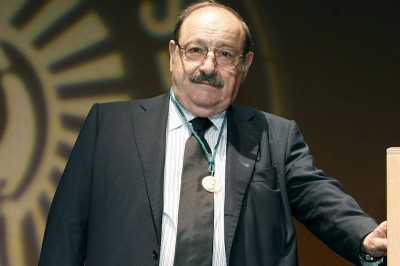Umberto Eco, author of ‘The Name of the Rose,’ dead at 84
Italian author and literary critic Umberto Eco died at his home Friday, according to his family.
In the late 1950s, he began developing ideas on semiotics: the study of signs, communicated as spoken, written, scientific or artistic language. But by far, his most famous novel was The Name of the Rose, which tells the story of a murder mystery set in the early 1300s at an Italian monastery.
Eco was born in Alessandra, Italy, on January 5, 1932, to Giulio and Giovanna (Biso) Eco.
The young Umberto had a Roman Catholic upbringing, being educated at one of the Salesian institution’s schools. A 1986 film adaptation of the book starred Sean Connery as protagonist William of Baskerville. “In the years since, he has continued to write fanciful essays, scholarly works, and four more best-selling novels, including Foucault’s Pendulum (1988) and The Mysterious Flame of Queen Loana (2004)”, wrote the Paris Review.
His father wanted him to become a lawyer but he chose instead to study philosophy at the northern University of Turin, where he became fascinated by the medieval world.
Though Eco was probably best known for his novels, he wrote and taught philosophy for many years, exploring such disciplines as semiotics and linguistics, among others.
Author of a wide range of books, Eco was fascinated with the obscure and the mundane, and his books were both engaging narratives and philosophical and intellectual exercises.
The prolific author was also known for his novel “Foucalt’s Pendulum”, which was divided into ten segments.
From 1956-1964 he worked as a cultural editor for RAI, Radiotelevisione Italiana, the state broadcasting station. In his non-writing life, meanwhile, he continued to amass a huge library-which numbered as much as 50,000 volumes by the time of his death on Friday night-and serve in various academic posts, including professor emeritus at the University of Bologna, a position he held from 2008 until his death.
In 2000, when awarding Eco Spain’s prestigious Prince of Asturias Prize for communications, the jury praised his works “of universal distribution and profound effect that are already classics in contemporary thought”.
The Name of the Rose became an worldwide publishing sensation, selling more than ten million copies, and “metamorphosed [the professor] into a literary star”.
He leaves a wife, Renate Ramge Eco, a German art teacher whom he married in 1962 and with whom he had a son and a daughter.








